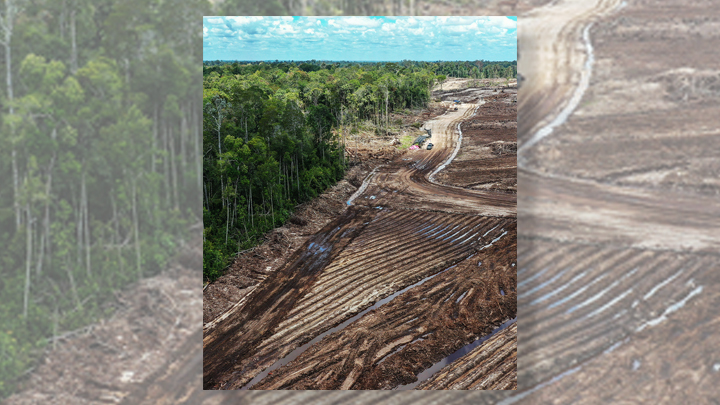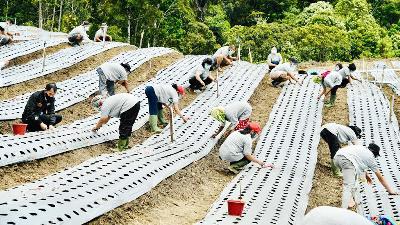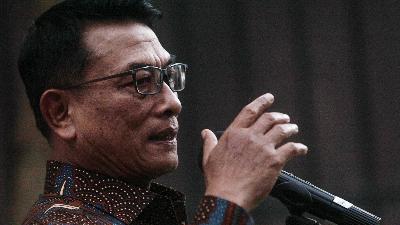Food Estate Disaster
Monday, October 11, 2021
President Joko Widodo’s food estate project has the potential to trigger an ecological disaster. It is against the law and is not transparent.
arsip tempo : 174349651543.

INSTEAD of bringing about food security, the government’s food estate project could result in Indonesia facing a climate crisis. President Joko Widodo should consider the environmental aspects while thinking about the matter of food provision.
It is claimed that the national food estate project, which began in the middle of 2020, will put an end to the threat of future food crises. Therefore, the government set aside 2.3 million hectares of new agricultural land in North Sumatra, Central Kalimantan, Papua, and East Nusa Tenggara with total funding of Rp1.2 trillion.
A year after the project began, an investigation by this magazine uncovered many problems on the ground. The clearing of 600 hectares of natural forest in Gunung Mas, Central Kalimantan, for example, resulted in the release of at least 250,000 tons of carbon emissions. In the rainy season, four villages in the region were struck by floods because of the loss of water catchment areas. As well as the threat to biodiversity, the habitats of orangutans there have been razed.
Meanwhile, the food estate project managed by the ministry of agriculture in Pulang Pisau and Kapuas in Central Kalimantan, and Humbang Hasundutan, North Sumatra, have also fallen short of what was hoped for. The value of the harvest is not up to productivity standards. The farmers who have worked so hard to follow instructions from the government feel they have lost out. The failure to improve the welfare of farmers should be the key factor in the evaluation of the sustainability of this project.
The Covid-19 pandemic has made people realize the fragile state of our strategic food reserves. The continual decline in the area under cultivation, the dependence on imports and poor productivity can all result in shortages of key staple foods in markets. The conversion of agricultural land continues, particularly in Java. Of the 8.5 million hectares of rice fields in 2012, only 7.5 million hectares remained in 2019. Since April 2020, the Food and Agriculture Organization (FAO) has also warned of the danger of a global food crisis.
Unfortunately, the government responded the wrong way to this threat. Food security should be achieved through the involvement of all food industry stakeholders, while still prioritizing the interests of farmers. All the government has to do is set clear targets and produce regulations that are fair and conducive for businesses in this sector. By involving itself directly in the operational implementation of the food estate project, the government is biased when fulfilling its role as a regulator. As a result, there is considerable potential for conflicts of interest and inefficiencies that could threaten the success of the project.
The participation of the defense ministry is clearly unhelpful. The deployment of troops to secure the clearing of forests for the food estate project in Gunung Mas not only sidelined farmers, but also revived social trauma from the New Order era. Local people say they have never been asked to contribute to the deliberations and are nothing more than spectators when the forests where they live for generations are bulldozed. And when floods come after the destruction of the forests, yet again it is local people who suffer.
The excuse of preserving strategic food reserves cannot be used as a justification for the government’s ignoring of many regulations. For example, a strategic environmental study, which should be a condition for the granting of permits, was only carried out four months after hundreds of hectares of forest in Gunung Mas had been cleared. The arbitrary way the development was carried out shows the government’s lack of caution in managing natural resources that are so important for the world.
Read articles:
- How Food Estate Project Destroying Kalimantan Forests
- The Profile of Agrinas
- Interview with Moeldoko on Food Estate in Kalimantan
- Interview with Syahrul Yasin Limpo on Food Estate in Sumatra
The government also involved private companies affiliated with particular parties or political figures without considering their track records and without transparent criteria. It is still not clear what the role of Agrinas—the majority shareholder of which is the foundation affiliated with the ministry of defense—is in the national food estate project. All efforts by Tempo to confirm this was met with no satisfactory response from the ministry of defense. Then there is the involvement of M-Tani, a company owned by Presidential Chief of Staff Gen. Moeldoko, which has led to questions about a conflict of interest.
If all these irregularities cannot be put right, there would be no tangible benefits from the project. President Jokowi has not learned from the mistake of President Suharto, who dreamed of turning peat bogs in Borneo into rice fields. There was also the blunder of President Susilo Bambang Yudhoyono in the Merauke Integrated Food and Energy Estate project. Instead of achieving food self-sufficiency, this last food estate project would only trigger an ecological disaster, impoverished farmers and led to corruption.











